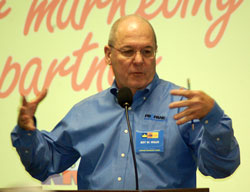 I didn’t have any flight delays unlike Chuck and Cindy, however, my posts on the 2007 Propane Technology Forum were delayed due the strict security of the internet I was accessing at the conference. I am back at my hotel now, online now with full access. Here’s the first of many posts to come…
I didn’t have any flight delays unlike Chuck and Cindy, however, my posts on the 2007 Propane Technology Forum were delayed due the strict security of the internet I was accessing at the conference. I am back at my hotel now, online now with full access. Here’s the first of many posts to come…
Cutting-edge innovation and environmentally friendly applications are the two major themes experts at the 2007 Propane Technology Forum are focusing on during their presentations on liquid petroleum gas. Roy Willis, President of the Propane Education & Research Council, gave the keynote address this morning, saying propane is “the mechanism for the things consumers need.” Roy stressed the importance of using the latest research and innovation in propane application to spur the growth of the propane industry. He says as propane use continues to become more efficient, it is vital to create new markets and develop new customers. In a separate in interview, I talked with Roy about where the propane industry has room to grow.
You can listen to my interview with Roy here:
Willis_Roy.mp3

 Some of the latest propane technology pairs propane with solar power to offer hybrid electricity generation systems. Stuart Weidie, Chairman of the
Some of the latest propane technology pairs propane with solar power to offer hybrid electricity generation systems. Stuart Weidie, Chairman of the 
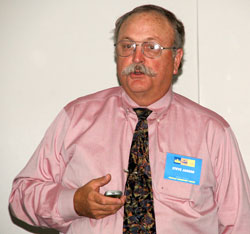 He said the pick-up burned to the ground while there was no escape of gas from the bus. He added that all the children riding the bus exited safely without any instance of injury or death. Dan said industry leaders joke about the safest place to put a propane gas tank in a motor vehicle: “make it the bumper.” He said 12,000 vehicles run on propane fuel in Texas.
He said the pick-up burned to the ground while there was no escape of gas from the bus. He added that all the children riding the bus exited safely without any instance of injury or death. Dan said industry leaders joke about the safest place to put a propane gas tank in a motor vehicle: “make it the bumper.” He said 12,000 vehicles run on propane fuel in Texas. Chuck has already
Chuck has already 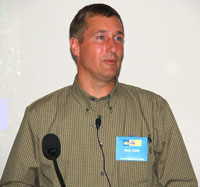 Paul Funk is one of the experts at the 2007 Propane Technology Forum who has taken all the talk about innovative propane research a step further. Paul is a scientist with the USDA-Southwestern Cotton Ginning Research Laboratory. He is among the first to put heat defoliation of cotton with propane into practice. Paul and I discussed what he’s encountered out in the field.
Paul Funk is one of the experts at the 2007 Propane Technology Forum who has taken all the talk about innovative propane research a step further. Paul is a scientist with the USDA-Southwestern Cotton Ginning Research Laboratory. He is among the first to put heat defoliation of cotton with propane into practice. Paul and I discussed what he’s encountered out in the field.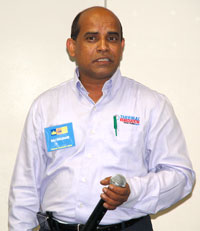 Paul Funk’s heat defoliation of cotton isn’t the only way propane-generated heat is being used. Temp-Air scientist Raj Hulasare says propane heat remediation is an ideal solution for treating bins, silos, and other storage vessels for pests. He adds that propane heat remediation is a particularly viable option for certified organic farms, which are restricted from using many chemicals to treat their stored crops.
Paul Funk’s heat defoliation of cotton isn’t the only way propane-generated heat is being used. Temp-Air scientist Raj Hulasare says propane heat remediation is an ideal solution for treating bins, silos, and other storage vessels for pests. He adds that propane heat remediation is a particularly viable option for certified organic farms, which are restricted from using many chemicals to treat their stored crops.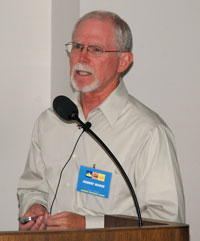 Several experts in the propane industry mentioned the innovative use of propane as an insecticide at the 2007 Propane Technology Forum, but Robert McGee with Texas A&M Agriculture Research is the expert whose presentation focused solely on propane’s capability to eliminate pests. In a brief interview, Robert and I reviewed the main idea of his presentation.
Several experts in the propane industry mentioned the innovative use of propane as an insecticide at the 2007 Propane Technology Forum, but Robert McGee with Texas A&M Agriculture Research is the expert whose presentation focused solely on propane’s capability to eliminate pests. In a brief interview, Robert and I reviewed the main idea of his presentation.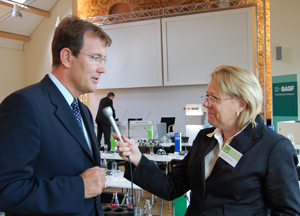
 I have been an ag journalist for 25 years and never participated in an event quite like the global press conference for BASF here in Germany.
I have been an ag journalist for 25 years and never participated in an event quite like the global press conference for BASF here in Germany.